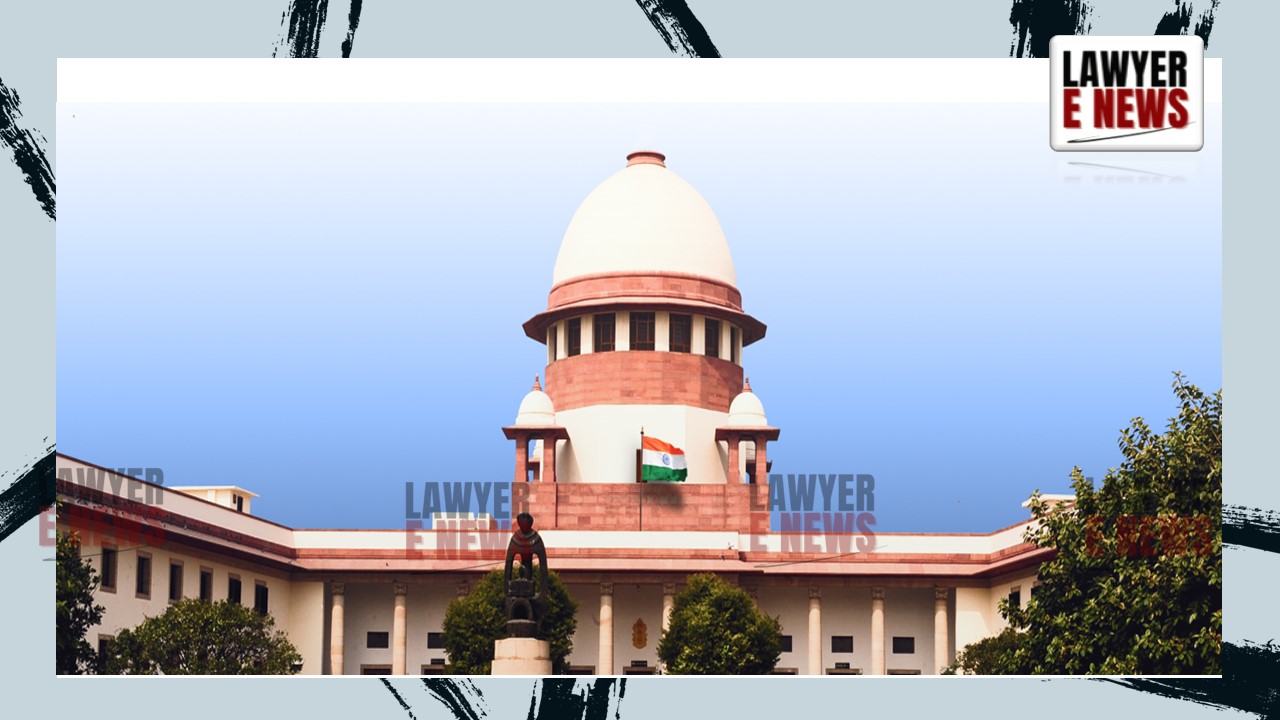-
by Admin
16 February 2026 1:47 PM



In a significant ruling Supreme Court of India set aside the forfeiture of ₹15.04 crores bid security in a case involving M/s. ABCI Infrastructures Pvt. Ltd. and the Border Roads Organisation (BRO). The Court, led by Chief Justice Sanjiv Khanna, criticized BRO for adopting an “obdurate and overly legalistic stance” instead of recognizing an obvious and inadvertent error in bid submission.
Dismissing the Himachal Pradesh High Court’s judgment, the Supreme Court ruled that clerical mistakes should not be exploited to inflict unjust penalties. The Court observed, “A mistake may be unilateral or mutual, but it is always unintentional. If it is intentional, it ceases to be a mistake.”
A Clerical Mistake Turned Into a Legal Battle
BRO had invited bids for the construction of twin tunnels at Shinkun La Pass in Himachal Pradesh and Ladakh, with a project value of ₹1,504.64 crores. The technical and financial bids were submitted on June 3, 2023, and M/s. ABCI Infrastructures Pvt. Ltd. was declared the lowest (L1) bidder when financial bids were opened on August 24, 2023.
However, a typographical error resulted in the company’s bid being recorded as ₹1,569 instead of ₹1,569 crores. Recognizing this error, the company immediately alerted BRO the next day, explaining that the omission of numerical values was either a clerical mistake or a technical glitch.
BRO, instead of acknowledging the self-evident error, insisted on treating ₹1,569 as a valid bid, demanded justification for the absurdly low amount, and forfeited the ₹15.04 crores bid security. The company approached the Himachal Pradesh High Court, but the writ petition was dismissed on October 7, 2023, leading to an appeal before the Supreme Court.
Supreme Court’s Criticism of BRO: “A Rigid and Unreasonable Approach”
The Supreme Court expressed strong disapproval of BRO’s conduct, stating that its refusal to acknowledge an obvious mistake had resulted in unnecessary litigation. The Court remarked, “A contract worth over ₹1,500 crores, requiring road and tunnel construction in a hilly terrain, can never be executed for ₹1,569. This does not even require an argument.”
BRO’s insistence on treating the bid as valid, despite repeated clarifications from the appellant, was described as an act of bureaucratic inflexibility. The Court remarked, “Mistakes, including by authorities, should be resolved through corrective steps. A practical approach could have avoided the delay, which was caused by BRO’s refusal to acknowledge the Appellant’s genuine error.”
Referring to the principle of proportionality, the Court noted that BRO’s decision to forfeit the entire ₹15.04 crores bid security was excessive and unjustified. It observed, “Where a mistake is apparent and promptly communicated before a contract is executed, the authorities are expected to act fairly instead of exploiting technical errors.”
Legal Precedents on Mistaken Bids and Equitable Relief
The Supreme Court relied on West Bengal State Electricity Board v. Patel Engineering Co. Ltd. (2001) 2 SCC 451, which held that: “Equitable relief should be granted where a bidder makes a material mistake in a bid, promptly informs the authorities, and requests withdrawal or correction before formal contract execution.”
The Court also referred to American Jurisprudence, which states: “An error that is patent and whose true intent is obvious may be disregarded, and the bidder should not be penalized for an inadvertent clerical mistake.”
In the present case, the Supreme Court noted that the forfeiture was based on a flawed premise, remarking: “Instead of declaring the bid non est due to the clear mistake, BRO asked the appellant to justify the bid, cancelled the notice, declared the appellant a defaulter, invoked the bank guarantee, and issued a fresh tender.”
No Financial Loss to BRO, But an Unjustified Punishment to the Bidder
Rejecting BRO’s justification that the forfeiture was necessary due to delays, the Supreme Court found that the fresh tender process resulted in an even lower L1 bid of ₹1,290 crores, compared to the earlier ₹1,351 crores. This meant that BRO ultimately awarded the contract at a lower price, proving that no financial harm was caused by the company’s mistake.
The Court further observed, “The alleged two-month delay by the appellant is incorrect. The error, submitted on June 3, 2023, became apparent only when financial bids were opened on August 24, 2023. The appellant promptly acknowledged the mistake on August 25, 2023.”
Final Judgment: Relief Granted, With a Nominal Penalty
While holding that the mistake was genuine and should not have led to forfeiture, the Supreme Court also acknowledged that the bidder had a duty to ensure accuracy. Striking a balance between equity and responsibility, the Court partially penalized the bidder while preventing unjust enrichment by BRO.
It directed: “The appellant shall pay ₹1 crore to BRO as a consequence of their error. Upon receiving this payment, BRO shall return the original bank guarantee of ₹15.04 crores within one week.”
By setting aside the Himachal Pradesh High Court’s judgment, the Supreme Court reinforced that public authorities must adopt a fair, pragmatic approach instead of enforcing technical errors with punitive measures.
Conclusion: A Strong Precedent for Equitable Treatment in Government Contracts
This ruling sets a critical precedent for government tenders and contract law, reaffirming that clerical mistakes should not lead to disproportionate penalties. The Supreme Court has made it clear that public authorities must act fairly, recognize genuine errors, and avoid causing financial hardship through bureaucratic rigidity.
By ensuring that the bid security was returned with only a nominal ₹1 crore penalty, the Court upheld the principle of fairness and proportionality, preventing an unjust outcome that would have set a dangerous precedent for bidders in large-scale projects.
“A contract worth ₹1,500 crores cannot be executed for ₹1,569 – the error was self-evident, and BRO’s insistence on enforcing it was both illogical and unfair.”
With this judgment, the Supreme Court has once again reinforced that justice must not be overshadowed by procedural technicalities, and fairness must always prevail over rigidity.
Date of Decision: February 14, 2025
